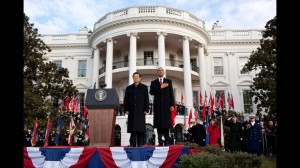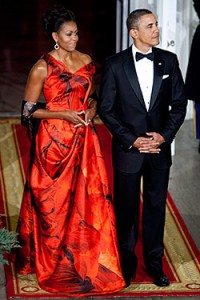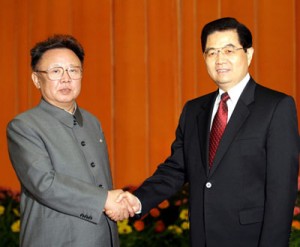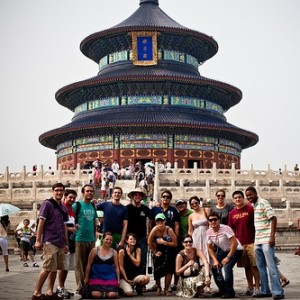A Jersey Shore Analysis of the Hu Jintao State Visit
State visits never produced tangible results, and last Wednesday’s visit of President Hu Jintao to Washington, D.C. was no exception. True a series of business contracts and joint ventures were announced, but not much else. Really though, that’s not why we watch state visits – especially ones involving leaders of the two largest economies in the world.
We watch them more because they are a reality show of sorts – watching two world leaders from vastly different cultures walk the fine line between appearing strong for one’s own country’s interests but at the same time, not completely trampling the other country’s interests. But unlike the Jersey Shore where one might just be sent home from the beach for misbehaving (think Angelina Season 1 AND Season 2), the consequences are much more serious when you are dealing with two countries whose future relationship can easily determine the fate of the world.
Fortunately, this State visit proved a lot more peaceful and face-saving than anything being shown on the Jersey Shore these days. While there were some surprises, especially on the Chinese side, there were no fist-a-cuffs. Overall, the visit seemed to show an improved relationship, at least rhetoric-wise, between the United States and China.
But this is a Jersey Shore analysis so enough of the feel goodness; the question still remains – who won? Below is a point-by-point analysis of President Hu Jinato’s State visit.
Point for China – Hu Finally Gets a State Visit
The fact that there was a State visit at all was a huge point for China. It’s been 13 years since a sitting Chinese president
was invited for a State visit and President Hu’s last visit to Washington in 2006 consisted of a lunch with President George W. Bush. Could anything be more embarrassing for a world leader than to just be offered the lunch menu at the White House?
Unfortunately, yes. Hu’s 2006 “official” (not state) visit was marred with embarrassing moments for the Chinese. First, China was introduced as the Republic of China – the official name for Taiwan – sort of a huge gaffe in U.S.-China relations. Second, a Falun Gong practitioner, a religious order that the Chinese government considers a threat to its rule, was able to obtain press credentials for Hu’s 2006 visit and protest at the event.
But for this visit, the Obama Administration pulled out all of the stops, making it a State visit to outdo all other State visits. President Hu was greeted at the airport by Vice President Joe Biden and quickly ushered to the White House for an intimate dinner with President Obama. At all times, China was introduced by its correct name and there were no protests on the South Lawn.
Culminating the event was Wednesday night’s State dinner, perhaps the most anticipated affair this winter. In addition to a fun and interesting guest list, Michelle Obama chose an amazing dress in homage to one of fashion’s favorite designers – the late Alexander McQueen – making the event the talk of the town of both politicos and fashionistas.
Point for the U.S. – China Gets (a little bit) Tougher on North Korea
North Korea is proving to be a particularly troubling aspect of U.S.-China relations. No one – including China – particularly cares for North Korea and its saber-rattling as Kim Jung-il’s son takes the rein of perhaps the world’s worst dictatorship. North Korea’s bellicose activities interfere with China’s economic relations with its Asian neighbors. But China has yet to take a strong stance against North Korea’s actions even though such actions upset the stability that China needs to continue its rise. China’s hesitance comes from the fact that it fears a collapsed North Korea; not only would there be the demise of another communist ally, but a collapsed North Korea would mean an influx of starving Korean refugees into China as well as sharing a border with the democratic and U.S.-military-backed South Korea.
For its part, the United States has begun to see North Korea as an increasingly real threat against its allies and itself. As a result, at Tuesday night’s intimate dinner between the two leaders, President Obama explained to President Hu that unless China takes a stronger stance against North Korea, the U.S. will be left with no choice but to rebuild a stronger military presence on the Korean peninsula.
That argument eventually carried the day. In the Joint Statement issued on Wednesday, China, for the first time,
“expressed concern” regarding North Korea’s nuclear build-up. Additionally, while China has urged the resumption of “six party talks” with North Korea, the U.S. has hesitated, seeing it as a reward for North Korea’s bad behavior. Evidently China and the U.S. were able to reach a compromise: before any six-party talks resume, the two Koreas must first resume their dialogue (see paragraph 18 of the Joint Statement). On Thursday, South Korea agreed to low-level talks with the North.
Half a Point for the U.S. –Human Rights Makes the Agenda but an Odd Assortment of “Human Rights Advocates” Advise President Obama
Human rights loomed large during Hu’s State visit. After meekly raising the issue during his State visit to China in November 2009, President Obama was having no criticism of his commitment to human rights. Secretary of State Hillary Clinton made that apparent in her speech on January 14, 2011 when she not just raised the issue of human rights but also mentioned specific human rights advocates that the U.S. believed were been unlawfully detained.
President Obama continued to publicly press the issue of human rights. President Obama publicly declared the universality of certain human rights as well as the need for the Chinese leadership to meet with the Dalai Lama. Perhaps the most surprising of all was when President Hu admitted that China still had a ways to go in better protecting human rights (see the Q&A portion of the Joint Press Conference).
Normally, this should receive a full point. But the U.S. loses a half a point because of form. Prior to President’s Hu’s visit, President Obama met with five China human rights advocates. These “advocates” included Prof. Andrew Nathan of Columbia University; Prof. Paul Gewirtz of the Yale China Law Center; author Zha Jianying; the wife of former Ambassador Winston Lord, Bette Bao Lord; and research scholar at the University of Maryland, Li Xiaorong.
While these five are likely well-informed on issues of human rights, there seems to be some missing names from the list of “human rights advocates.” Sharon Hom of Human Rights in China has dedicated her life – and at times has risked her safety – to advocate for greater human rights protection; one can’t think of anyone else more qualified. And if one wants to stick with academics (three of the five study human rights), it is questionable why Prof. Jerome Cohen of NYU School of Law was not in attendance. Prof. Cohen continues to lambast China on its human rights record on an almost bi-weekly basis in his South China Morning Post articles and actively supports many human rights attorneys in China.
But most of all, why weren’t the Chinese human rights activists themselves invited? Currently, the wife of missing human rights lawyer Gao Zhisheng is in the United States as is the wife of imprisoned human rights lawyer Guo Feixiong. Why not invite either of them to speak with the President of the current human rights situation in China? Or exiled dissident Yang Jianli currently residing in the U.S.? Or better yet – why not have a Skype chat with any of the human rights lawyers presently in China (Teng Biao, Mo Shaoping, Tang Jitian, Liu Wei)? The latter might be a bit too much to ask, but the list of human rights advocates invited to speak with President Obama should have been longer.
 Point for China – U.S. Promises to Rein in Spending
Point for China – U.S. Promises to Rein in Spending
As the largest holder of U.S. debt, China is very concerned about the U.S.’ spending habits. The Federal Reserve’s announcement of injecting more cash into the U.S. economy through “quantitative easing” only worsened China’s fear that its U.S. dollar reserves would lessen in value. So when President Obama, in response to a reporter’s question during the joint press conference, stated that the U.S. must take greater responsibility in saving and cutting the U.S. deficit, China was very happy.
Half a Point for the U.S. – Government Procurement
China’s closed government procurement market and its indigenous innovation policy has been a issue for U.S. businesses. China is not a member of the WTO’s Government Procurement Agreement (“GPA”) and as a result is not required to have an “open” government procurement market. China has submitted two bids in the past few years to be a member of the GPA, most recently this past summer. However, both applications have fallen far short and as a result, China remains outside of the GPA.
But surprisingly, in the U.S.-China Joint Statement (paragraph 27), China agreed to resubmit an application to the GPA by the end of 2011 and include sub-central government entities as subject to its proposal. Such an agreement was unexpected and likely a welcome development to the U.S. business community.
So why half the point? Seeing is believing in this case. It’s not completely in China’s self-interest to be a member of the GPA at this stage so anticipate that its renewed application will still fall short of GPA requirements. And even if it becomes a member, it’s questionable if China will enforce laws to promote an equitable government procurement market.
Point for U.S., Point for China – 100,000 Strong Initiative Articulated
During President Hu’s visit, Michelle Obama, in a speech before a thousand DC-area students, reaffirmed the Administrations’ commitment to sending 100,000 U.S. students to China on various study abroad programs (the “100,000 Strong Initiative”). In 2008, less than 15,000 U.S. students (on both the college and high school levels) studied abroad in China. The U.S. has a long way to go before we reach 100,000 students but its commitment to achieving that goal is a win-win for both China and the U.S.
Americans’ knowledge of China is abysmally low; as China rises, our lack of our understanding its history, culture or language becomes dangerous. Study abroad programs can help bridge that gap. While very few U.S. students will continue on their China path after their study abroad program, just being exposed to the culture and the difficulties that the nation faces is important. But there will also be some students that will continue on that path, providing an invaluable resource to the American government as China continues its rise as a global power.
The “strong” in the 100,000 Strong Initiative is more about strengthening the cultural ties and understanding between our two nations. While China sends 10 times the number of students to the Untied States, it is important that U.S. students go to China for those Chinese who will never come to America. What’s even more important is that the 100,000 Strong Initiative reaches out to community colleges and historically black colleges and universities, both of which have been underrepresented in China study abroad programs. It is important that the students the U.S. sends to China reflect our great diversity.
No Points for Anyone – Military-to-Military Ties Remain the Same
There doesn’t seem to be a change in military-to-military ties. After the U.S. sold arms to Taiwan last January, China broke off military ties and the relationship has barely warmed. When Secretary of Defense Robert Gates visited Beijing a few weeks ago, a stealth jet fighter was flown unbeknown to even President Hu Jintao.
The Joint Statement (paragraph 9) includes language on improving and deepening communication between the two militaries. But it appears to be boilerplate language similar to the language found in the Joint Statement issued after President Obama’s visit to China in November 2009. The fact that China’s military remains non-transparent, secretive and slightly threatening is a serious issue. The fact that President Hu did not seem to have control of the military, even though he is the nominal Chairman of the Central Military Commission, is even more troubling, for both the U.S. and China.
The U.S. military is stationed through out China and patrols many international waters. The Chinese military is becoming increasingly assertive at times. Small incidents have occurred in the past. But without good communications between the two militaries, it is easy for any small incident to become an international one that could upset the stability in the Pacific. Hopefully the promised high-level military visits between the two countries will soon produce results. Then both the Chinese and American people will find it easier to sleep at night.
Winner?
It’s a tie. As far as State visits go, this was a pretty good one. Everyone got something they wanted and can bring back positive results to their respective people. Aside from military relations, U.S.-China rhetoric seems to be improving. Hopefully this trend can continue.
 On Facebook
On Facebook By Email
By Email 





